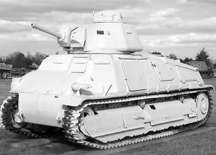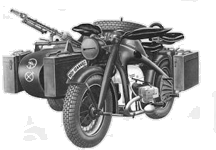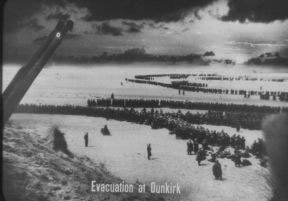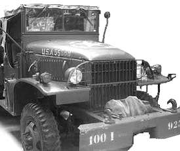|
Stories of Debacle and a Sawed up GMC Truck By Pascal Sobas My stepfather Pierre Quenton, aka "Pierrot" ("Pierrot" is the diminutive nickame for Pierre) was a mechanic in a tank regiment then and was at Sedan when the German tanks crashed through the Ardennes. The Ardennes forest was "unpracticable to tracked vehicles," according the French high command. Apparently the German high command was not aware of that fact. Neither was Sedan's mayor who had voiced concern. But what's a mayor in front of a bunch
British and French soldiers were doing there at that time: sit in the dunes, dodge the Stukas and pray for a miracle. -"We were close to a British AA battery and the Stukas came. A bomb fell squarely into one of the gun pits. I saw a leg flying by." Then the miracle came: thousands of ships and boats of every description, British and French, civilian and military, sailed to
not forget the French and British
soldiers who sacrificed themselves and whose outstanding resistance
stopped the Germans on the outskirts of Dunkirk just long enough for
the survivors of the disaster to slip out. These heroic deeds unfortunately
have been forgotten almost, amidst all the chaos, defeat, and renouncement.
of sky and the bridge with the captain standing there in his whites. Then a Junkers 88 attacked us from three quarters astern. They dropped three bombs. The first two fell short and the last one fell just a little bit too long. It went BOOM! Inside the hull and we got sprayed by water. All the time I looked up: the captain didn't even turn his head." The British tend to have an attitude sometimes.
Pierrot was eventually discharged and went back to France. I don't know the circumstances of his return. He went back to his bicycle shop in Boulogne sur Seine, near Paris, and to his favorite occupations: mechanics, bicycle racing, chasing ladies and drinking with his friends. I asked him once why he had not joined the Resistance. -"Tu sais môme, quand je suis revenu je me suis dit que je me battrais plus jamais pour des c.. pareils." -"You know kid, when I came back I told myself I'd never fight again for such a bunch of jerks." I don't blame him, frankly. While Pierrot was traveling toward Dunkirk aboard his freight train, or shortly thereafter, my father and my mother had fled Paris, like thousands of others fearing the worst, and they ended up in Rochefort sur Mer, on the west coast. It had been declared an open town, meaning no troops were supposed to be stationed there. Of course there were troops there and my mother Andrée and my father Léopold witnessed an episode which is the perfect illustration of the general state of mind of the French Army then. -"A troop convoy was there, recalled my mother. There was an officer walking back and forth, a lieutenant or a captain. Very elegant, with leggings, cream-colored gloves, and a stick. Then a soldier on one of the trucks asked him: Yo! Dummy, where are we goin'? We thought the soldier would be punished for this disrespectful attitude. But the officer just looked up at him and said: I don't know. At that point we knew this war was lost." My parents didn't do anything heroic during the war. They just endured, like millions of others all over occupied Europe. Time passed — four long, painful years. Then freedom came back, brought in by the "Yanks." It was a time of rejoicing in France. But it was also a time of starvation and lack of everything. War had passed over the country and was rolling toward Germany. And it had taken all that was left with it. The only ones who had plenty of everything were the Americans. They not only had food, Lucky Strike cigarettes and chocolate, they had
You don't get it, replied the Sargent, the truck comes with the gas. Have a nice day." And with these words he walked away to the nearest Metro station and disappeared forever. And Pierrot and his buddies found themselves the quite embarrassed owners of an official stolen US government vehicle loaded with several hundreds of gallons of official stolen US government gasoline, sitting on Boulevard Marcel Sembat. The truck had to vanish. Fast. In the backyard of the bicycle shop was a well. A medium size well and they decided to dismantle the truck and throw the pieces in it. They probably could have sold the spare parts but Pierrot admitted they were scared out of their wits. Four years of Nazi occupation tends to make people like that. A GMC truck is solidly built. It went quite smooth for the bodywork and the engine, but when it came to the chassis, the transmission axles and differentials it became a different matter. Besides, the well was full to the rim with the rest of the truck. So they undertook to saw off the axles and the chassis with hand saws. That's all they had. They had torches but no acetylene of course. "Strong stuff these GMCs." Pierrot used to say. It took eight of them the whole night to finally reduce the chassis and the axles to more manageable pieces of scrap metal. They destroyed more than a dozen saw blades in the process — not to mention the blisters. After that episode, that night was remembered as "the night when we sawed off that GMC truck." My heartfelt thanks to that anonymous Sargent. What he did may not have been honest, but what he sold Pierrot and his friends that day helped some people to stay warm and eat. Pascal Sabas
|
|
Visitors since
June 6, 2000 |





